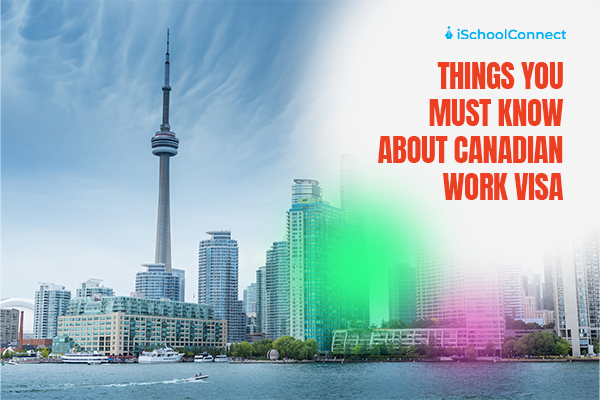Table of Contents
- An introduction to Canada work visa
- Canada work visa permit details
- What are the different types of work permits?
- What conditions should I keep in mind for a Canada work permit?
- What are the eligibility criteria for a Canada work visa?
- Documents required for Canada work permit
- Canada work permit categories
- Canada work visa from India
- Key takeaways
- FAQs
An introduction to Canada work visa
Canada has a strong financial system and plenty of jobs, making it a top choice for many. It has fewer people without jobs compared to the U.S., and so many fun and interesting jobs to choose from! If you’re thinking about moving from your country to work, why not consider a Canada work visa? The pay is great, life is awesome, and almost all students get a job they learned for within two years after finishing school. Canadians love their work and put their heart into it, which makes working in Canada even more attractive.
Canada work visa permit details
In 2021, Canada granted permits to more than 4 lakh overseas candidates. Canada is a country that provides several opportunities for you to establish yourself financially. A Canada work visa or Canada work permit is necessary for professionals from other nationalities seeking employment opportunities in the country.
Canada is one of the world’s leading economies and a great place for individuals searching for work. To get a work permit in Canada, you need to receive a job offer from an eligible employer in the country. LMIA (Labor Market Impact Assessment) provides a potential employer with ESDC (Employment and Social Development Canada). This gives the employer permission to recruit foreign skilled workers
What are the different types of work permits?

The following are the two types of Canadian work permits-
Open work permit
The Canada open work permit visa is not job-specific, so applicants do not require the Labor Market Impact Assessment (LMIA) or an offer letter from an employer who has paid the compliance fee.
An open work permit allows you to work for any employer in Canada except for those companies that do not comply with labor requirements. An open work permit does not allow you to work with organizations promoting services such as personal massages.
Employer-specific work permit
Foreign nationals seeking employment in Canada are more likely to obtain a closed work permit, with or without a Labor Market Impact Assessment (LMIA). This is also known as an Employer-Specific Work Permit.
The employer-specific work permit restricts to a single employer and has specific terms and conditions that you need to abide by.
Planning a family move
In Canada, while you’re working, it could be possible for your partner, whether married or in a common-law relationship, along with any dependent children, to join you. They might also have the opportunity to work or study during their stay.
What conditions should I keep in mind for a Canada work permit?
The conditions you need to keep in mind when applying for a Canadian work permit are as follows-
- The type of work you can do needs to be specific
- The employer you can work for should have a proper license
- The place of work should be legal
- Your period for work needs to be specified
What are the eligibility criteria for a Canada work visa?

To legally obtain a work visa for Canada, there are a few criteria that need to be met-
- A completely filled-out visa application form must be submitted.
- Your valid passport or any other travel document specified by IRCC
- Offer letter from employee
- Letter of invitation from employee
- Medical exam certificate
- A filled out VFS (Visa Facilitation Services) consent form.
- Need enough proof of reserve or funds to support your travel.
- Other documents, if required.
Documents required for Canada work permit
Getting your documents in order is essential to seeking employment opportunities in Canada. Be at ease; we’ve got you prepared with a list of crucial documents you may review and prepare in advance!
All nationalities wishing to work in Canada must possess the following document-
- Original passport for the entire duration of the job
- Proof of educational qualification
- Proof of applicant’s existing work experience which should include-
- Copy of appointment letter
- Copy of relieving letter
- Copy of salary slips by the employer.
- Bank statements are required.
- Proof of personal funds, which should include –
- Income tax returns for the past six years
- Bank statements from the last six months
- Family information form (if the dependent family is traveling)
- Copies of marriage certificates and birth certificates in cases where your dependents are traveling with you.
- Job offer by the employer
Canada work permit categories
Canada work permits are applicable for the following individuals-
Business
Business is a broad category that includes candidates who are business visits, intra-company transferees, professionals, traders, investors, and others who need a work permit.
Temporary workers
Depending on their qualifications and the type of work, Canada issues both open work permits and employer-specific work permits for people applying to work in the country. Temporary employees may also modify or renew their work authorization as needed.
Permanent workers
A Canadian work permit for permanent workers is different from that for temporary workers as it allows eligible individuals to immigrate as skilled workers in the country.
Temporary workers need to renew their work permits but permanent workers are exempt from that.
Express Entry is a computerized system that manages the applications of skilled workers who want to become permanent residents of Canada.
Students
In 2021, Canada was home to a whopping 621,656 international students seeking higher education opportunities in the country.
Based on their qualification, international students are allowed to work on-campus and/or off-campus as co-op students or interns. Students who
have completed graduation can apply for a post-graduation work permit in the country.
Agricultural workers
Individuals who are hired through the Seasonal Agricultural Worker Program (SAWP) are eligible for a Canada work permit.
You can apply for this work permit, if-
- You are a citizen of a country that takes part in the SAWP program.
- You are recruited by the government.
- You will be working for SAWP employers in Canada.
Canada work visa from India
Indians have the highest population density in Canada.
To obtain a Canada work visa, Indians can apply online as well as offline.
For online applications-
You can go to the Government of Canada’s official website, finish the process under “Immigration and Citizenship,” then select the “work” tab and follow the on-screen instructions.
For offline applications-
You can complete the process on the official website of the Government of Canada by following these steps-
- Go to the “Immigration and Citizenship” menu
- Then select “My Application”
- Under “My Application” you can find “Forms and Guides”
- Scroll down to “Application for a work permit outside of Canada”
- Finally, download the forms, fill them out, and submit them to the Canadian VAC (Visa Application Centre).
Key takeaways
- There are two types of work permits for Canada work visa applicants –
- Open Work Permit
- Employer-Specific Work Permit.
- When applying for a Canada Work Permit, legal documentation is crucial.
- You can apply for a Canada Work Visa through both online and offline applications.
Liked this blog? Read next: USA vs. Canada: Which is better for studying abroad?
FAQs
Q1. How long will it take to get a Canada work visa?
Answer – Depending on the visa office, it may take approximately two to nine months to get a Canada work visa.
Q2. What do I do if my Canada work permit has a mistake?
Answer- The border services officer reviews your paperwork to ensure you may enter Canada before printing your work permit. Ask the concerned border services officer whether there is a misprint on your work permit.
Q3. Who comes under a dependent work visa permit?
Answer- The Canadian government permits immigration for dependent family members, such as your spouse or children, under the immigration for family members category.






